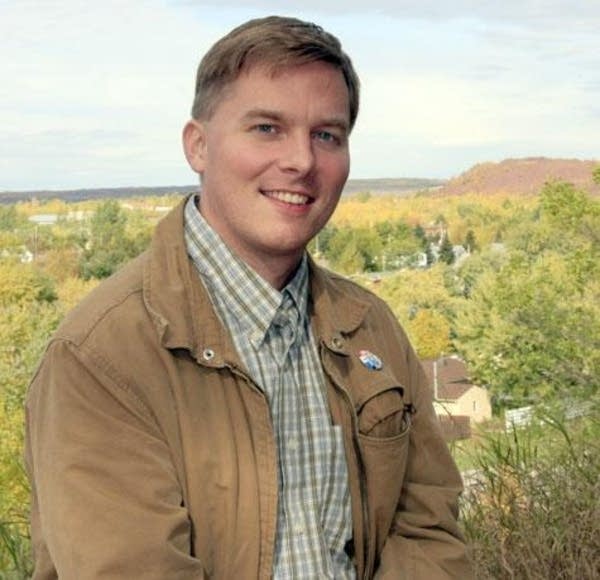The lesson in Superior's surprising economic win streak
Go Deeper.
Create an account or log in to save stories.
Like this?
Thanks for liking this story! We have added it to a list of your favorite stories.

Aaron J. Brown is a writer and community college instructor from the Iron Range. He is the author of the blog MinnesotaBrown.com and host of the Great Northern Radio Show on 91.7 KAXE. He is also a source in MPR News' Public Insight Network.
---
Superior, Wisconsin,
has a different smell
at every street corner
and it changes with the wind.
Rusted smokestacks
spew pink vapor
and the sky turns gray
late at night.
Turn Up Your Support
MPR News helps you turn down the noise and build shared understanding. Turn up your support for this public resource and keep trusted journalism accessible to all.
Unshaven men
load boxes of booze
along the liquor store door
back in the alley.
Bleating foghorns
and slow, rattling trains
sound like unwitting cattle
trudging off a trailer.
I wrote this poem in a creative writing class at the University of Wisconsin-Superior. It's the kind of poem a journalism major would write on assignment. This small industrial city shares an economy with its Twin Port of Duluth and the Iron Range towns that feed its rail yards and shipping docks. Separated from the rest of Wisconsin by relative wilderness, the clearest sense that Superior is part of that state comes from its citizenry's disturbingly ubiquitous loyalty to the Green Bay Packers.
And I always liked Superior for many of the same reasons I love my native Iron Range. Superior is just a bigger version of an Iron Range city, made more diverse by its university and its status as a regional center for the rural Wisconsin towns to its east.
Like the Range, and its fellow port city of Duluth, Superior had it rough through the 1980s and 1990s. When I wrote that poem in 2000 it was a fair assessment of the town. Frankly, it still is. But the story for Superior changed quite a bit just recently.
On Jan. 16, Superior officials, Gov. Scott Walker and business leaders announced the location of Kestrel Aircraft in Superior. Jobs promised: 600.
On Jan. 24, Exodus Machines announces a deal with Caterpillar Inc. that will gradually expand its operations. Jobs promised: 300.
On Jan. 26, rumors swirled that Iron Range-based Magnetation might locate a pellet plant in Superior instead of near its Itasca County scram mining operations. Not a done deal, yet, but media reports put Superior as a strong contender. Jobs promised: 100 to 150.
That's 1,000 jobs, plus many more spinoffs, all in one city of about 26,000 people. One could be tempted to say that some economic development geniuses must have struck gold in Sup-town. Indeed, that's the narrative already beginning to percolate in certain circles. And while the leaders in Superior have a lot to be proud of, and the people a lot to celebrate, I think several factors combined to create this situation.
Superior is part of a diversified economic zone. The Twin Ports have made great strides in diversifying their economy and reaching out to new residents in a way that hadn't been done in half a century, if ever. Duluth is reversing its downward trend in population and is palpably a different city from 15 years ago. As the universities in the Twin Ports have grown, bringing in many new young people, the opportunities for them to stay have increased. Superior is poised for success for some of the same reasons Duluth has already succeeded.
Superior's past failures have created affordable real estate that is zoned for all manner of activity. For years, Superior was the Morlock to Duluth's Eloi, doing the ugly toil of Rust Belt industry. When American industry suffered through the 1980s and 1990s, Superior suffered and many of its commercial and industrial zones declined. Like the forest fire that clears the land for new growth, Superior's past woes now make ready a number of attractive deals for new businesses.
And yes, Superior is in Wisconsin, where the current conservative government promises to undo and streamline all manner of regulations. This is less a factor in the Kestrel and Exodus projects, but certainly part of why Magnetation is flirting with the Badger State.
While the role of regulation in commerce remains a tricky debate, the political dynamic is new. If Superior is a viable economic driver, it can parlay whatever Wisconsin offers more effectively against whatever Minnesota does. And it works the other way, too. This factor is real, certainly one that conservatives should use as an argument for less regulation. But I'd also argue that political winds blow many directions for many reasons. Unfettered deregulation and desperate incentives come with long-term risks.
Despite my continued affection for Superior and its people, I argue that Minnesota's Iron Range is also poised for a winning streak — if we're smart. Superior's recent success was due to many factors. Many of the same factors now working to Superior's advantage are present on the Range. Our real estate prices are low and properties plentiful. Technology is making possible new forms of employment in the shadows of pines and the sheen of glistening lakes. We too, are close enough to Duluth to benefit from regional partnerships.
The Iron Range problem is both simple and vexing. We must learn to welcome new people, encourage new ideas and use our strengths to create new economic growth — not only in mining, but more. It's as much an attitude problem as a political one. The goal can't be accomplished this year, but the Iron Range could be made dramatically more prosperous and diverse in 10 years if we start now.



